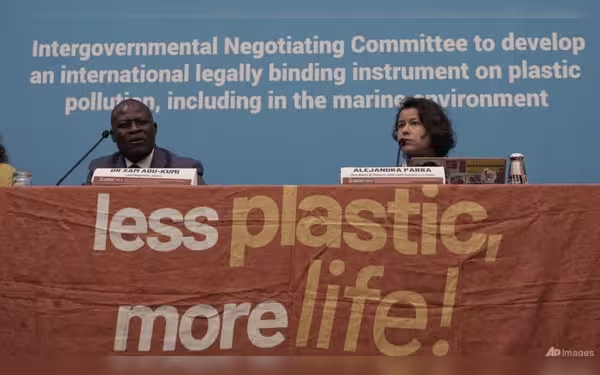Sunday, December 22, 2024 07:32 PM
Global Tensions Rise Over Plastic Treaty Negotiations
- Over 100 countries push for plastic production caps.
- Oil-producing nations resist limits, favor waste management.
- Negotiations face setbacks amid deepening divisions.
 Image Credits: channelnewsasia
Image Credits: channelnewsasiaGlobal negotiations on a plastic pollution treaty face challenges as nations clash over production limits and waste management strategies.
In recent years, the issue of plastic pollution has emerged as a significant global concern, prompting nations to come together to seek solutions. The United Nations has been at the forefront of these efforts, aiming to establish a legally binding treaty to curb plastic pollution. However, as discussions unfolded during the fifth and final UN Intergovernmental Negotiating Committee meeting in Busan, South Korea, doubts began to surface regarding the feasibility of reaching a consensus.
On the last day of scheduled talks, over 100 countries advocated for a cap on plastic production, recognizing the urgent need to address the root causes of plastic pollution. In contrast, a smaller group of oil-producing nations, including Saudi Arabia, pushed for a focus solely on managing plastic waste rather than limiting production. This division highlights the complexities involved in negotiating a global treaty that could potentially be as impactful as the 2015 Paris Agreement on climate change.
The proposed treaty aims to tackle several critical issues, including capping plastic production, managing plastic products, and providing financial support to developing countries to implement the treaty's provisions. However, as of 4 PM on the final day of talks, a final plenary session had yet to be held, leaving many negotiators and environmental groups feeling disheartened.
Dr. Sam Adu-Kumi, the Lead Negotiator for Ghana, expressed his disappointment, stating, "If you're calling for a high, ambitious treaty, it means that (it's) calling for obligations, commitments on the part of all parties." He emphasized that without such commitments, the negotiations would likely need to continue elsewhere, indicating a potential setback in the global fight against plastic pollution.
The divide between nations was further illustrated in a revised document released by the chair of the meeting, Luis Vayas Valdivieso. This document, which could serve as the foundation for a treaty, was filled with various options on contentious issues, reflecting the ongoing disagreements among participating countries.
Countries like China, the United States, India, South Korea, and Saudi Arabia are among the top producers of polymers, which are essential components in plastic manufacturing. Their significant roles in the industry make it challenging to reach a consensus on production caps. Fiji's chief negotiator, Climate Minister Sivendra Michael, voiced frustration at the lack of constructive contributions from some nations, urging them to either engage meaningfully in the discussions or step aside.
As the world grapples with the escalating plastic pollution crisis, the outcome of these negotiations will have far-reaching implications. A successful treaty could pave the way for a more sustainable future, while failure to reach an agreement may prolong the environmental challenges posed by plastic waste. It is crucial for all nations to recognize the importance of collaboration and commitment in addressing this pressing issue. The stakes are high, and the time for action is now.













